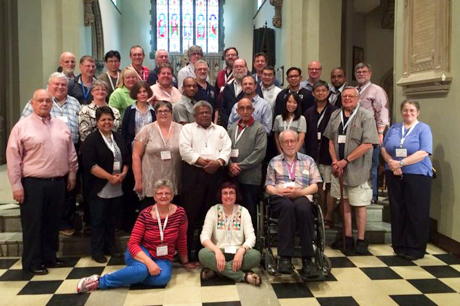The International Anglican Liturgical Consultation has just finished its most recent meeting in Montreal with representatives from churches in Aotearoa New Zealand and Polynesia, Australia, Canada, England, Hong Kong, Ireland, Japan, Korea, the Philippines, Scotland, the Solomon Islands, Southern Africa, the United States of America, Uruguay and Wales.
The group reaffirmed their desire to promote the deepening of communion between the Churches of the Anglican Communion by renewing its life of liturgy and prayer as integral to the mission of the Church by being a resource to Provinces and the Instruments of Communion on questions of liturgy and common prayer. Noting that many provinces are contemplating revisions to prayer books, hymnals and other liturgical texts, the Consultation feels their work of sharing of knowledge, resources and processes is especially important in the life of the Communion at this time.
The previous meeting was held in Dublin in 2013, where there was focused attention on rites of healing and reconciliation. This meeting continued that work. Archbishop Fred Hiltz, Primate of Canada, Bishop Mark MacDonald, National Indigenous Anglican Bishop of Canada, and Fr. Michael Lapsley SSM, Director of the Institute for the Healing of Memories were the primary speakers. Archbishop Fred and Bishop Mark explored the journey toward reconciliation being taken by the Anglican Church of Canada with the Indigenous peoples in the wake of that church’s role in the Canadian Indian Residential Schools. Fr. Michael Lapsley spoke both of his own journey towards healing and reconciliation in South Africa and of the wider work of the Institute and its workshops. The three speakers spoke from their experience and different perspectives, and the common ground was recognition of the power of deep-rooted institutional political oppression, which dehumanized and traumatized peoples. It was clear from all three presentations that the journey towards reconciliation requires space, time and patience and should include ritual moments and symbolic enactments. The issues presented by the three speakers were reflected on and translated into a liturgical framework through work in small groups. The outcome of the discussion has been a commitment to produce guidelines and resources for rites to support corporate reconciliation. On-going task groups will be exploring the areas of the relevant Biblical texts in contexts; theology of reconciliation and baptismal identity; and the frameworks for developing rites of corporate reconciliation.
The meeting also took note of the Archbishop of Canterbury’s Consultation on Peace and Conflict Prevention and seeks to work in partnership with this initiative.
Those in attendance were:
Aotearoa, New Zealand and Polynesia ; Tricia Carter; Anglican Church of Australia; Dane Courtney, Elizabeth Smith; Anglican Church of Canada; Terry Brown, John Hill, Jay Koyle, Lizette Larson-Miller Edward Simonton, Eileen Scully, Gregor Sneddon; Anglican Church of Southern Africa; Cynthia Botha, Keith Griffiths; Anglican Communion in Japan; Shintaro Ichihara, Saya Ojiri; Anglican Church of Korea; Nak-Hyon Joseph Joo; Anglican Church of South America (Uruguay); Enrique Illarze; Anglican Church of Melanesia (Solomon Islands); Anderson Saefoa; Anglican Church in Wales; Catherine Haynes; Church of England; Anne Dawtry, Alec George, Harvey Howlett, Christopher Irvine, Bridget Nichols, Phillip Tovey; Church of Ireland; Gerald Field, Alan Rufli; Hong Kong Sheng Kung Hui; Chun-wai Lam; Episcopal Church In The Philippines; Tomas Maddela; Scottish Episcopal Church; Douglas Kornahrens; The Episcopal Church, Barrington Bates, Robert Brooks, Walter Knowles, William H. Petersen; ACC Office; John Gibaut
image from ACNS

